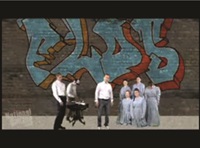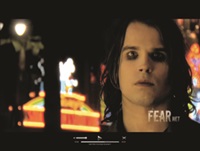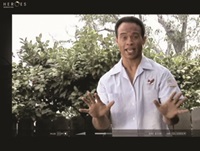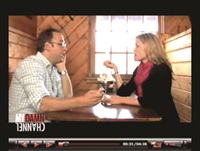BY LYNDON STAMBLER

Vlog |

Polygamist Gangsta Rap |

The Dark Path Chronicles |

Going Postal |

Wainy Days |
Sitting down at your computer to surf the Internet can easily make you feel like you have attention deficit disorder. Kung fu fighters and skateboarders, comedians and hucksters, strippers and evangelists. With more than a billion people using the Internet, it presents a tantalizing canvas for filmmakers of all stripes. But can DGA directors find fame and fortune—or at least have some fun—creating content for it?
In the last few years, the DGA has negotiated over 100 new media contracts. And some professional directors have entered this emerging arena, bringing dramatic storytelling and technique to the Web. To find out what their creative and financial experiences have been like, we talked to five members who have tested the water.
Twisted Pictures, which produced the Saw horror movies, announced in Variety in 2007 that they were seeking a filmmaker to create a series of webisodes that could also run as a movie. The working title: Internet Killer. Butler, who has directed movies for USA Network and the Sci Fi Channel and wanted to make a feature film, read the story and started to think about the worst thing that could happen to somebody on the Internet.
That's how he conceived Vlog, the saga of an online stripper in peril that stars Brooke Marks, an actual online stripper with five million fans. He used some of Marks' web videos as inspiration for the 18 webisodes that were released one per day last June on Break.com. Because of the subject matter, it was tough selling ads for Vlog, which nevertheless attracted millions of viewers to the site.
In addition to the webisodes, which he kept deliberately unpolished to recreate the feel of the online world, Butler used the same material and a three-act structure to create a 71-minute feature film. He had three cameras going while shooting the webisodes. "We were literally shooting two movies at once," Butler says. "We lit it differently for the webisodes than we did for the feature film."
Vlog premiered at the Hollywood Film Festival in October. "The creative freedom was fantastic," he says. "Not only is it satirizing America's obsession with sex and violence online, it's also a satire of the narrative created from clicking through 10 or 15 viral videos."
Butler, who made the film with $150,000 from Twisted Pictures, didn't lose money, but didn't turn a profit, either. "I was given a salary upfront, but until it sells to a non-Internet-based market, I have no return," he says.
A few years ago, someone pointed out to Jerry Zucker, who has directed (with Jim Abrahams) such movies as Airplane! and Ruthless People, that there was little professional content on the Internet. In response, and armed with venture capital from U.S. Venture Partners and Venrock, Zucker created NationalBanana.com, an offbeat website featuring original comedy bits created by Zucker and his friends.
As a veteran filmmaker, Zucker wanted to try something new between pictures. "As a matter of fact, doing this was as much fun as I've ever had in the business. We have a funny idea, we laugh and we just do it."
The site features one to three minute webisodes and random bits created for $1,000 to $10,000. "It's whatever we feel like that day," Zucker says. For instance, the two-minute Polygamist Gangsta Rap spoofs the FLDS sect with a Warren Jeffs-like character who, dressed in prison jumpsuit, raps to a chorus of young women in pioneer dresses.
The process reminded Zucker of his days in the '70s when he, his brother David and Abrahams made video shorts for a theater they established in West L.A. called Kentucky Fried Theater, which later morphed into the film Kentucky Fried Movie.
Zucker's experiment is temporarily on hold while he develops a TV show that sprang from the website. "It is still my hope to create a comedy playground, including different kinds of Web satire and games, not just video bits," he says. "It was always my intention to do something with many different kinds of comedy experiences. I think it can be done. It certainly needs more money than we had to start with."
Mary Lambert, who directed Pet Sematary and a documentary about female senators called 14 Women, got her start by making music videos in the '80s such as Madonna's "Like a Prayer." When she pitched the vampire story The Dark Path Chronicles to FEARnet.com, she wanted to play with the idea of making music video-like webisodes.
When linked together, the seven webisodes (four to five minutes each) create a 30-minute narrative, but the viewer can still get the emotional dynamics of the characters if they play around with the order. Lambert liked the freedom to be very visual and try things that aren't part of the usual formula of storytelling. "Because the music is more important than the dialog," says Lambert, "the pictures are more important, so they have to be very strong. The tableau has to tell the story."
After making 15 features, Lambert concedes that it's going to be hard to make money from the Internet. She made enough to cover costs, but sees it more as a sketchbook for developing her next film. "As a director, if you can get somebody to pay for your playtime, you're doing good," she says.
Independent filmmaker Yule Caise was attending UCLA film school when he met Tim Kring, the creator of NBC's hit Heroes. Kring invited Caise to direct a mock six-part documentary for the Internet about a hero from feudal Japan called Takezo Kensei: Sword Saint. Caise put his knowledge of Japanese history from his travels and Harvard education to use in creating Takezo Kensei. The series was nominated for a 2007 TV Guide Online Video Award and was part of Heroes' Emmy-winning online package.
Sword Saint was so successful that Kring asked Caise to write and direct Heroes' first live-action Web series, Going Postal, that was financed by NBC.com. The webisodes, some of which have been sponsored by Sprint and Nissan, have allowed Heroes to gain a large presence on the Web, that includes online graphic novels.
"It's a great place to think of different visual ways to tell a story. It's different from traditional moviemaking because the rules haven't all been invented yet. Sometimes it's just me with the camera in my hand."
David Wain, who began making short comedy videos in the '90s after graduating from NYU film school, says that the Internet is already a viable medium where a director can make a living. When Rob Barnett launched MyDamnChannel.com in 2007, he offered Wain financing to make shorts, as well as creative control and ownership. It was an offer he couldn't refuse, so he began making his Wainy Days series, twenty-six five-minute webisodes. "Every episode I meet another woman and screw it up in some hopefully funny way," he says.
My Damn Channel gives him a budget for each webisode. "They're inexpensive but it's enough to pay the crew and actors and leave a little left over for me."
The Pickup (#16) has gotten 2.25 million views on YouTube. The series also won a Webby Award for best comedy series in 2008. Wain isn't bothered by the five-minute format. "That's the relationship we have with the computer. You watch it in between doing something else."
Wain continues to work in TV and released his first studio film, Role Models, in November, but thrives on the independence of the Web. "It's the immediacy, the creative freedom, the ability to work with lots of different people doing things that are lower stakes, and it makes money for me."
There are no conclusions to this story yet, just the slow evolution of a new medium. "We may never figure out how we're all going to make money on this," says Butler. "It just may be a way for us to express ourselves."
But some directors believe it might be profitable one day. Lambert notes that younger people routinely watch TV shows, films and webisodes on computers. "If it takes hold the way music videos did in the '80s, it could become a lucrative format," she says. "When MTV began, nobody knew how they would make money, either."
Caise, too, is optimistic. He credits the Guild's new media contract with boosting his career. "It's exciting for a filmmaker who was starving not that long ago to be making a living and be able to see things on the Web that I had a hand in creating and directing. I feel like I hit the lottery."
Zucker compares the experience to the kinescopes of the early days of television. "We're going to remember the days when we had to wait for something to download and the sites had banner ads on them," he says. "A lot of it simply has to do with broadband getting broader. When you can see Internet content on a 50-inch television screen in HD, that's when everything is going to change."